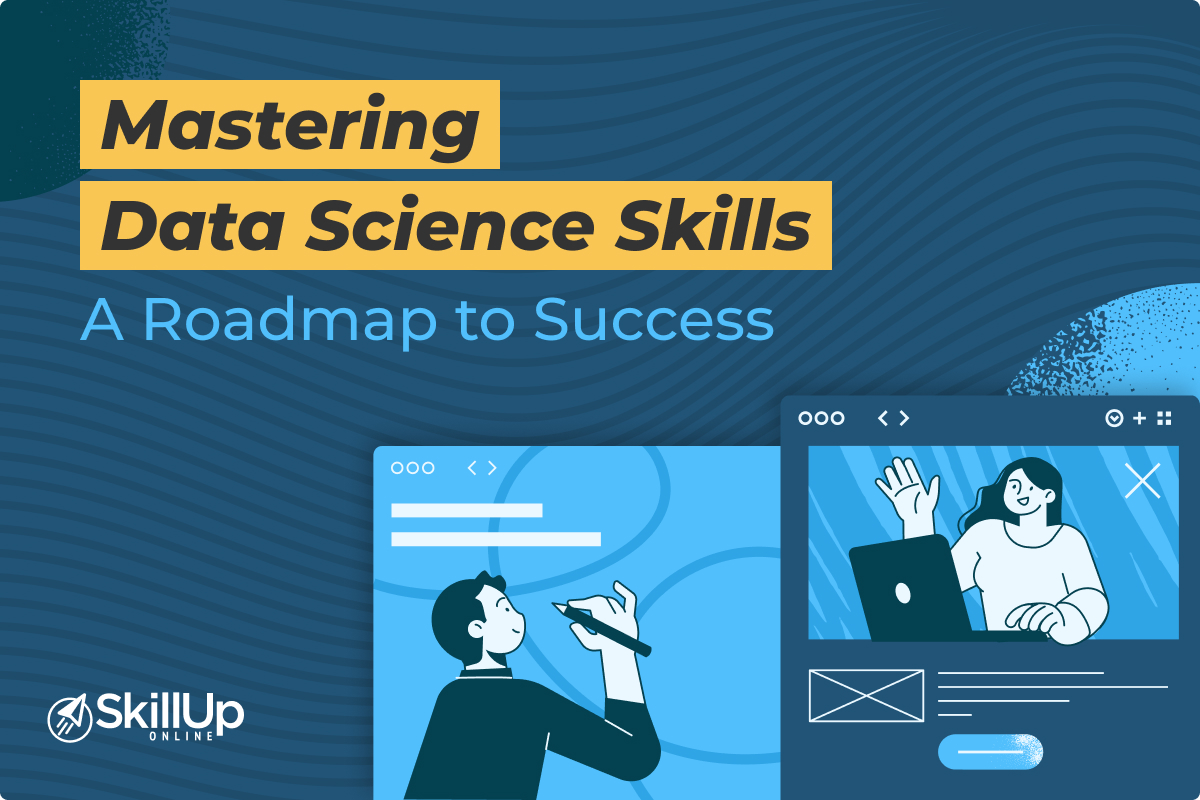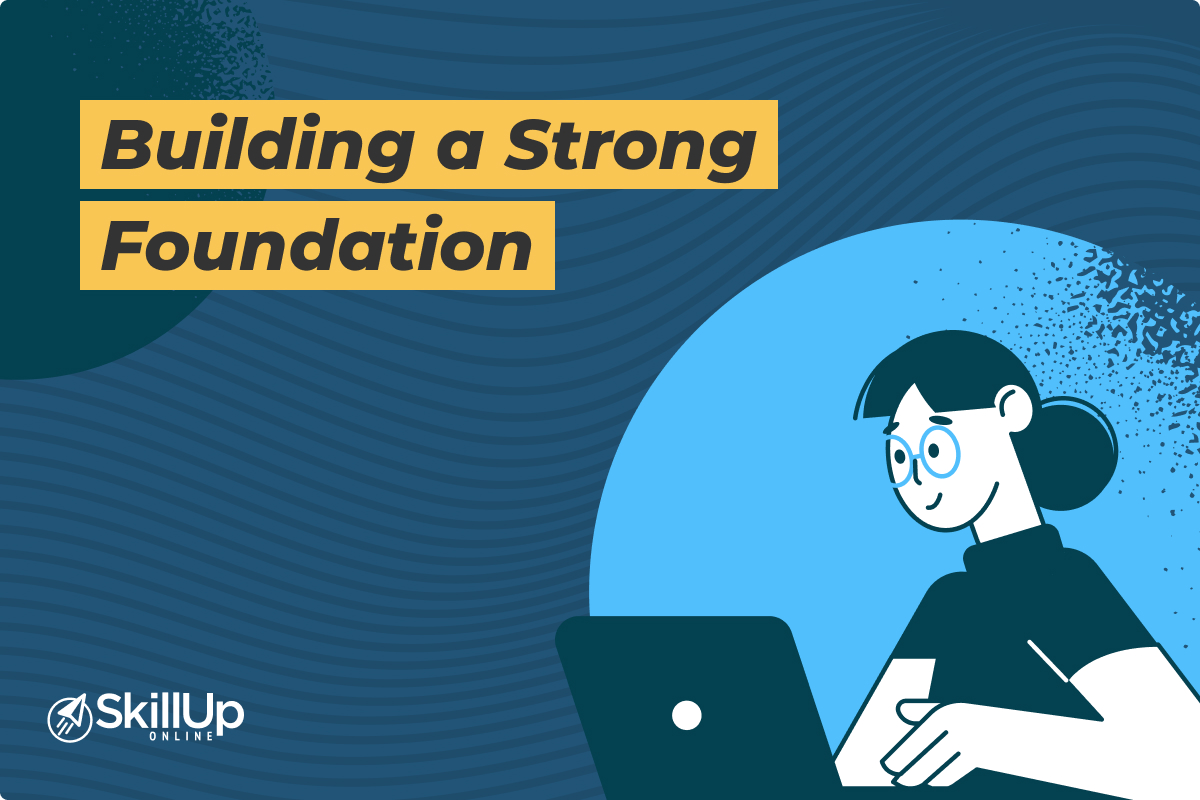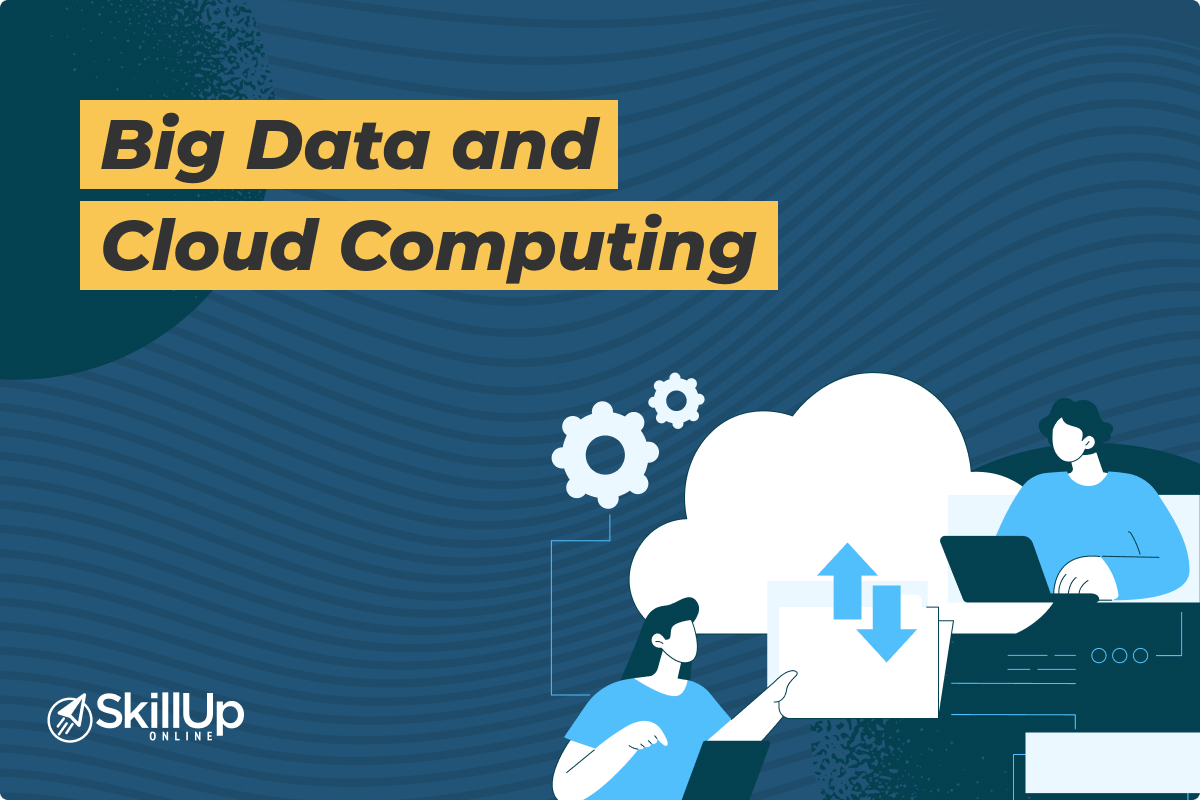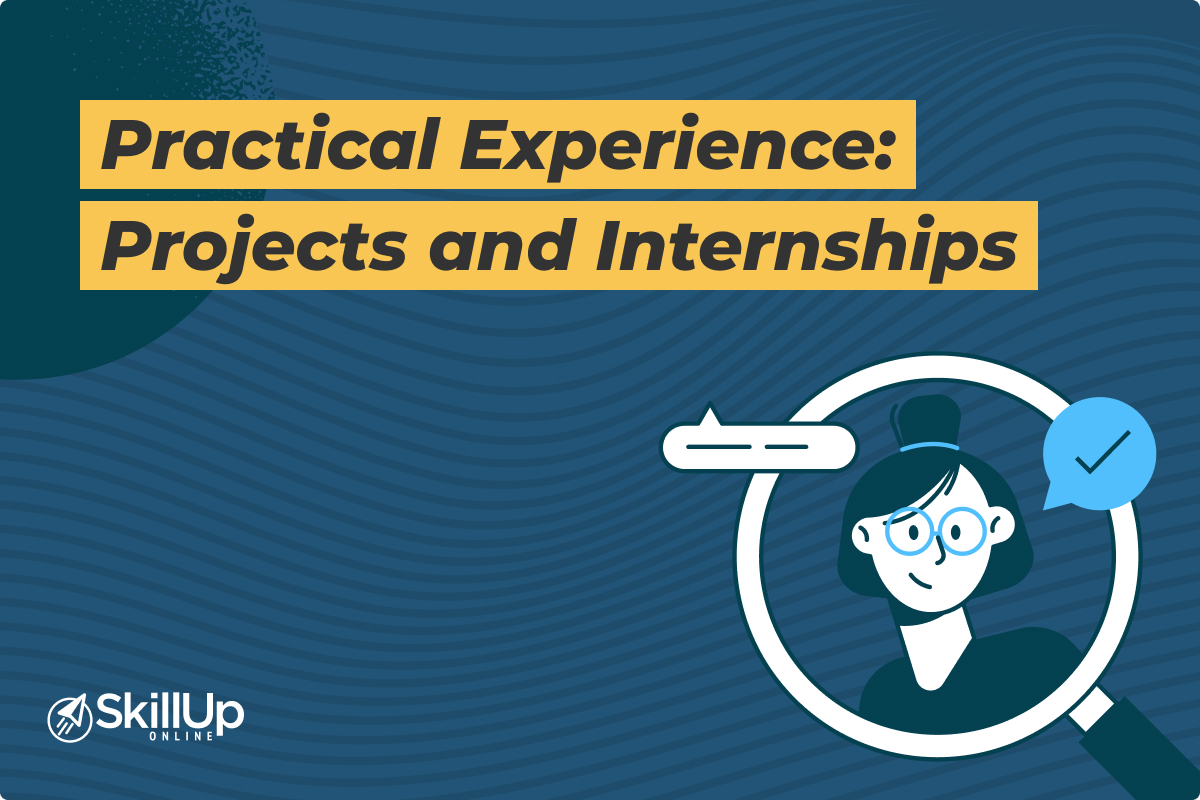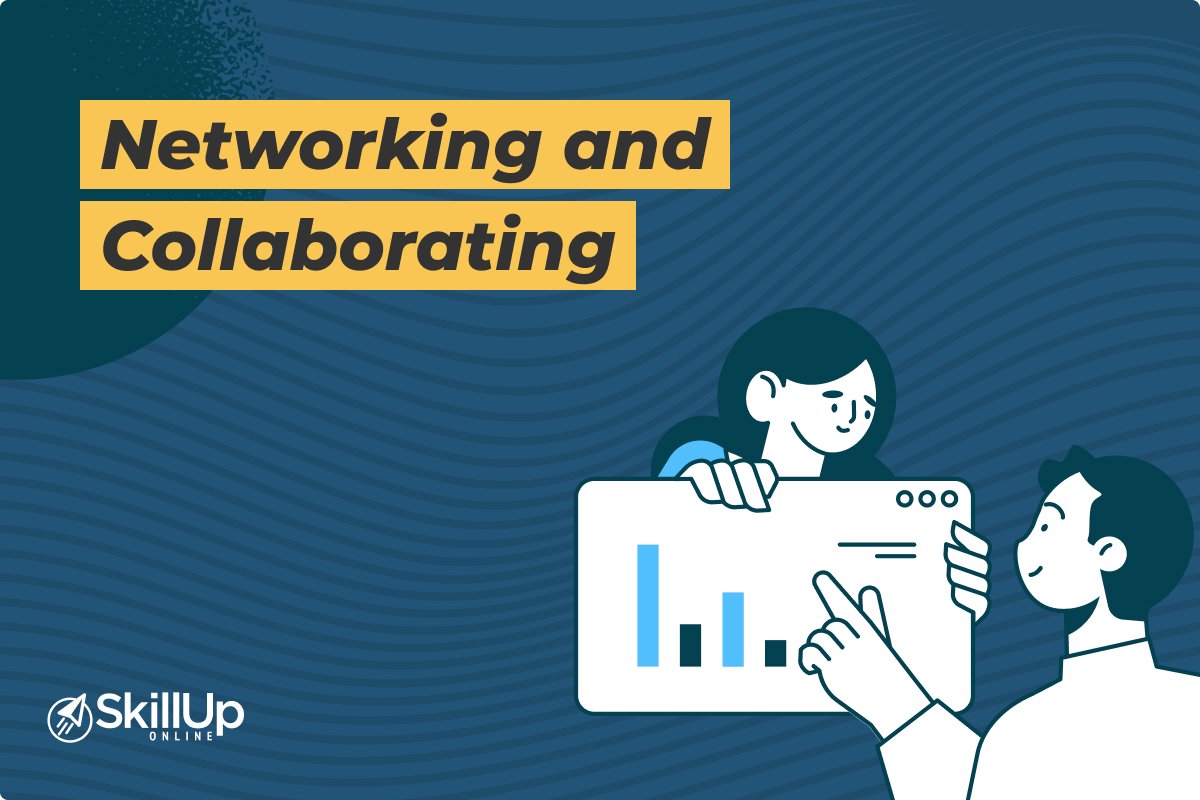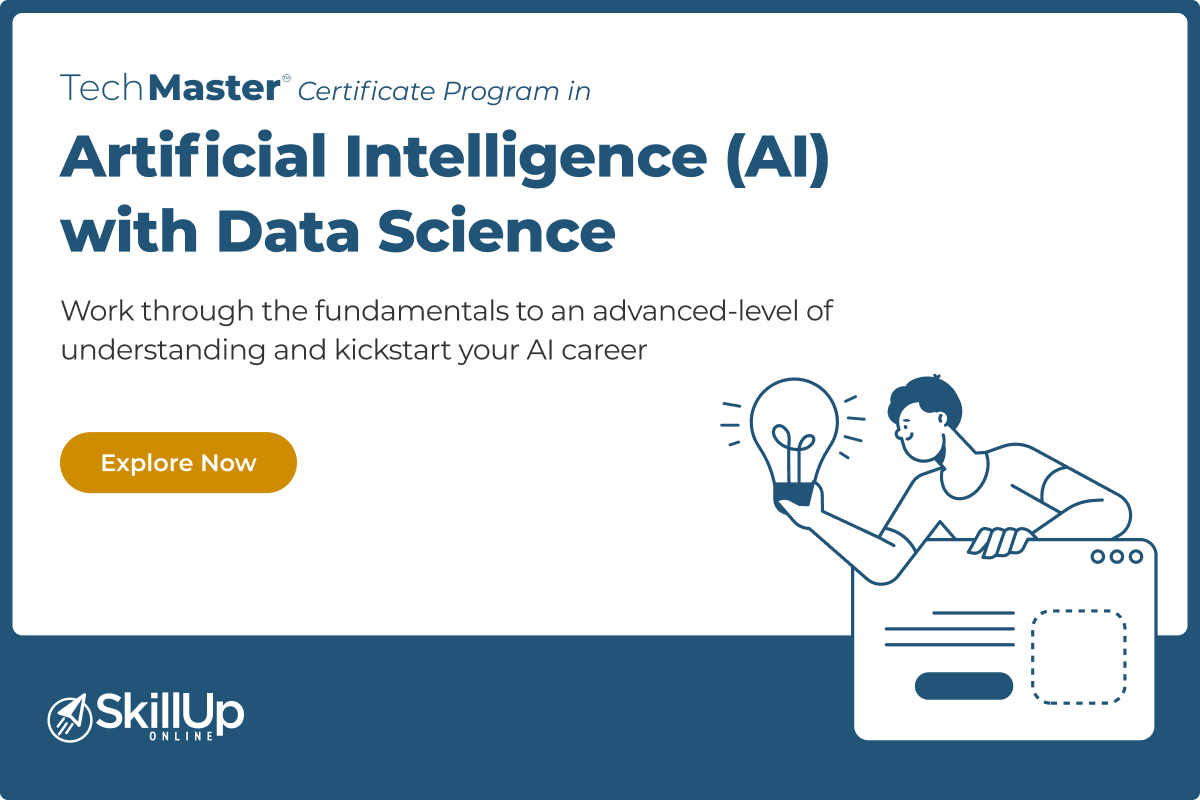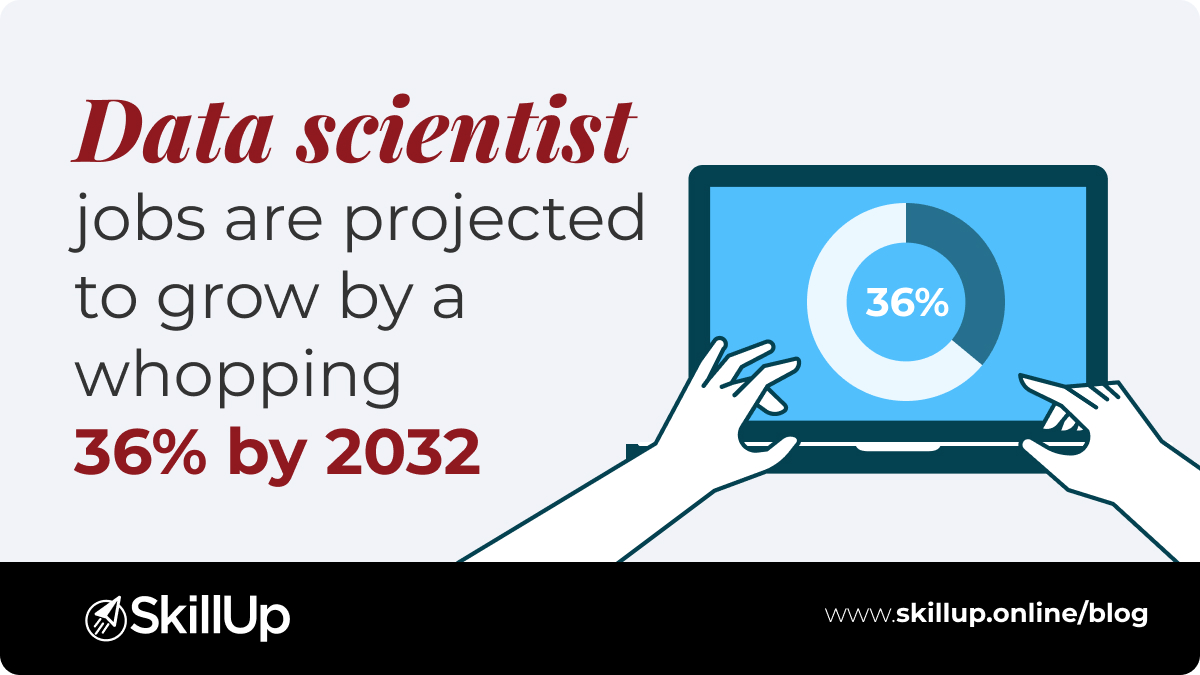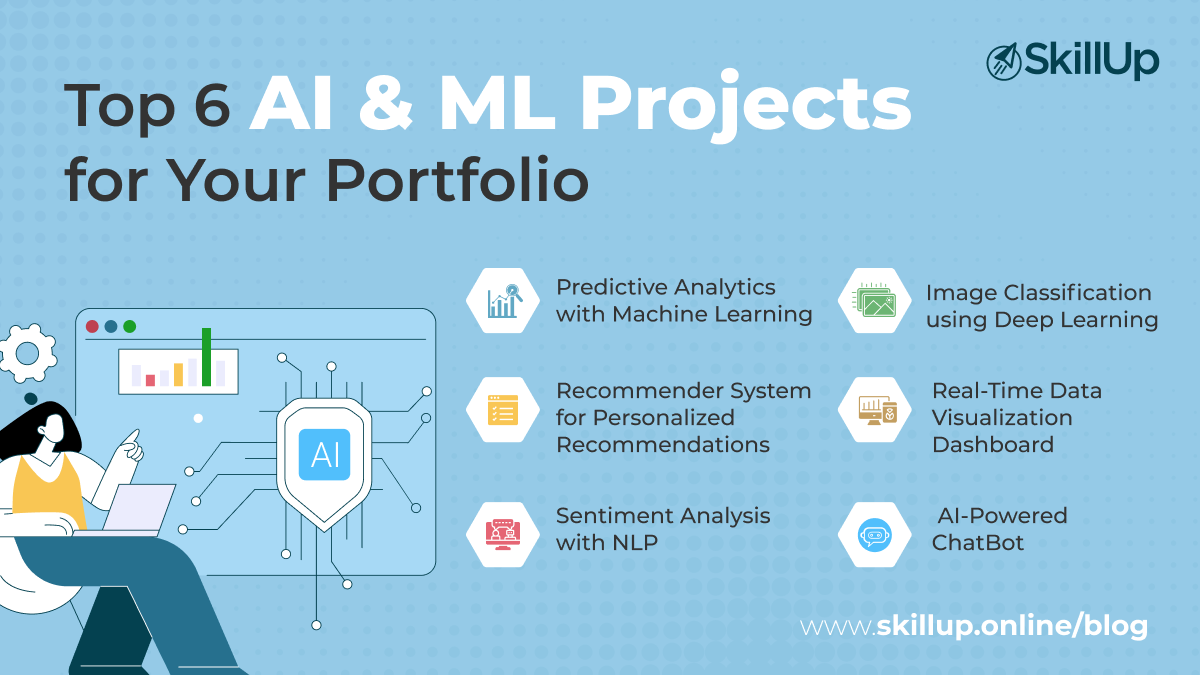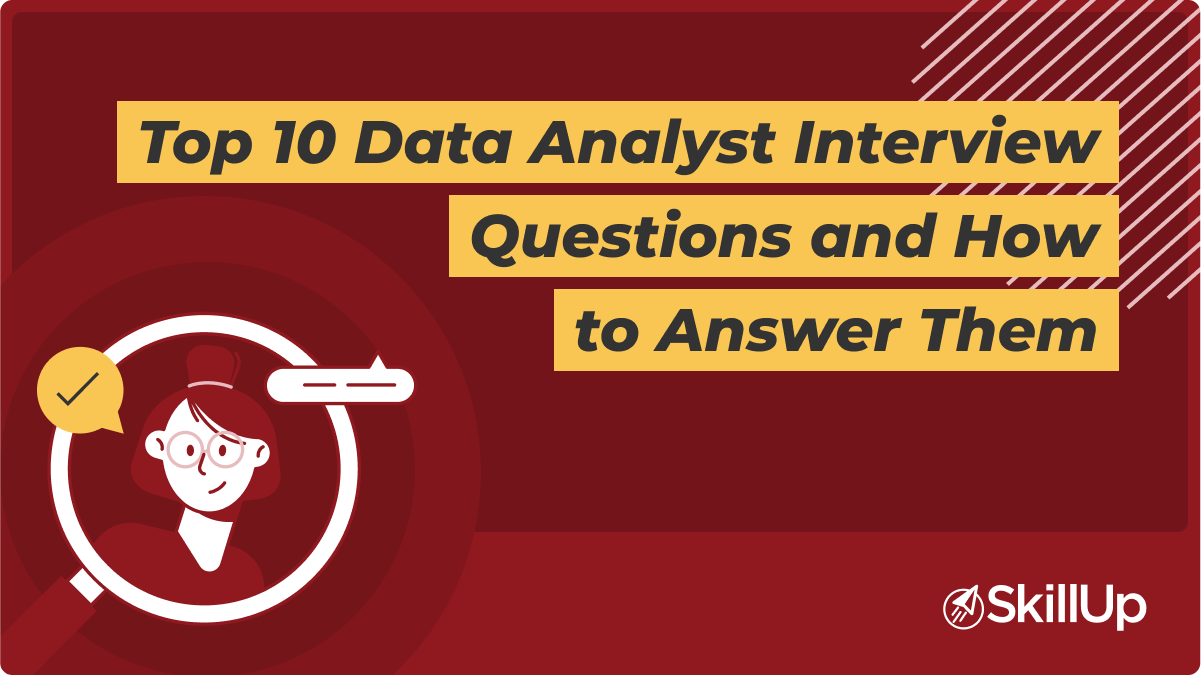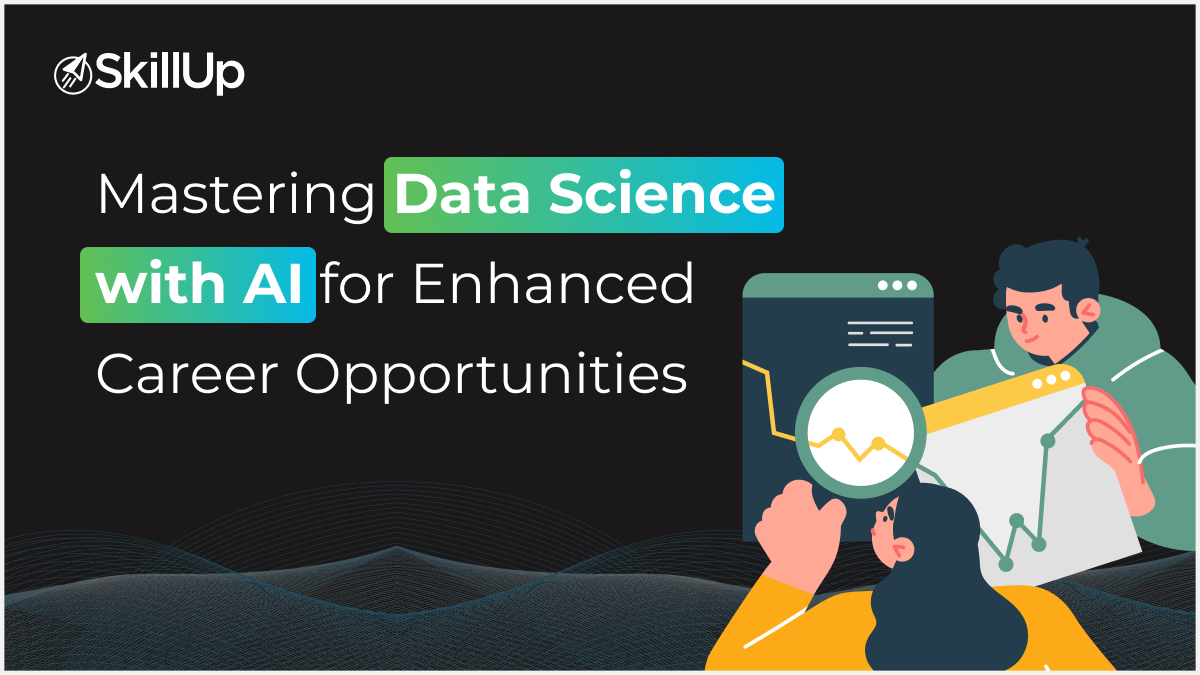In today’s data-rich world, proficiency in data science has become increasingly valuable across industries. The field of data science is expected to see a 23% growth from 2022 to 2032, far outpacing the average for all occupations. Data scientists are sought after for their ability to derive meaningful insights from data, enabling businesses to make informed decisions and gain a competitive edge. Whether you’re just starting out in the field or looking to enhance your existing skills, having a clear roadmap can significantly accelerate your journey to success in data science.
This roadmap aims to walk you through the key skills, best practices, and educational resources you’ll need to navigate this complex yet rewarding field successfully.
The Essential Skills for Data Scientists
Generally, the skills are categorized into technical skills and human skills.
Technical Skills
- Statistical Analysis: Data science is deeply rooted in statistics. From hypothesis testing to predictive modelling, understanding statistical methods is key.
- Programming: Coding is a fundamental skill for data manipulation and analysis. Languages like Python and R are commonly used in the field.
- Data Wrangling: Cleaning and preparing data are a major part of a data scientist’s role. Proficiency in data preprocessing techniques is crucial.
- Machine Learning: This is where machine learning models come to life. Knowing machine learning algorithms and their applications is essential for data-driven decision-making.
Human Skills
- Problem-solving: Being a data scientist isn’t just about crunching numbers, it’s about solving complex issues that affect real-world processes.
- Communication: Your findings must be easily understandable by others. Effective communication skills are vital, especially when explaining technical matters to non-technical stakeholders.
- Teamwork: Data science is often a collaborative effort. Knowing how to work well in a team and manage projects is key to your success.
Building a Strong Foundation
The language of data science is grounded in mathematics and statistics. A solid understanding of these areas is paramount for anyone aspiring to excel in the field. Let’s look at some of the key mathematical concepts you need to grasp.
- Linear Algebra: Understand vectors, matrices, and their properties to manipulate large datasets efficiently.
- Calculus: Get to grips with derivatives and integrals for understanding machine learning algorithms and optimization methods.
- Probability and Statistics: Master statistical measures, distributions, and hypothesis testing to make data-driven decisions.
Having a sturdy foundation in these areas will significantly improve your data science capabilities. While it might sound daunting, a variety of resources can help you achieve mastery in these subjects. One effective approach is through online courses. SkillUp Online’s Foundation of Artificial Intelligence and Machine Learning course covers the essential AI and ML elements you’ll need in data science.
Programming Proficiency
Programming is the backbone of data science. It allows you to manipulate data, create algorithms, and even develop data-driven products. While several languages can be useful, Python and R are the undisputed frontrunners.
- Python: Python is widely known for its simplicity and readability, making it a great starting point for beginners. Plus, it boasts a robust ecosystem of libraries such as Pandas for data manipulation, Matplotlib for data visualization, and Scikit-learn for machine learning.
- R: R is another heavyweight in data science and is particularly useful for statistical analysis and data visualization. It has a steep learning curve compared to Python, however, but it does offer a variety of specialized packages for complex data tasks.
Which to Choose?
Deciding between Python and R can be tricky. Python is generally more versatile, making it suitable for a wide array of data science tasks. R, on the other hand, excels in specialized statistical analyses.
Both languages have thriving communities and ample resources for learning. The good news is that you don’t necessarily have to choose. Many data scientists are bilingual, using Python for some tasks and R for others.
Data Manipulation and Analysis
Data is the lifeblood of any data science project, but raw data is rarely ready for analysis. That’s where data manipulation comes in. This process involves cleaning, transforming, and enriching data to prepare it for analysis.
Tools and Libraries
There are multiple tools at your disposal. Python’s Pandas library is a powerful resource for data manipulation, while SQL is excellent for data querying. In R, you have the dplyr package for similar tasks.
Data Analysis
Once your data is ready, it’s time for analysis. You could be using descriptive statistics to summarize data or machine learning algorithms to make predictions. Given the complexities, it’s crucial to have a human touch to decode this complex subject matter. And that’s precisely what SkillUp Online’s TechMaster Certificate Program in Artificial Intelligence (AI) with Data Science aims to do. It provides the kind of human-based support you need to tackle complex data science tasks.
Machine Learning and Artificial Intelligence
Machine learning and artificial intelligence are rapidly becoming indispensable in data science. While they may seem daunting at first, the key to mastery is starting with the fundamentals.
The Fundamentals
Before diving into complex algorithms, understanding the basics of Machine Learning and Artificial Intelligence is crucial. For a foundational understanding, consider enrolling in SkillUp Online’s course on the Foundations of Artificial Intelligence and Machine Learning.
Hands-on Projects
Once you’re comfortable with the basics, hands-on projects are the next step. Projects not only reinforce your understanding but also give you practical experience, making you job ready. For instance, creating a recommendation system or a chatbot can be an excellent project to start with.
The Path Forward
The beauty of ML and AI is their applicability across sectors—from healthcare to finance and entertainment. It is a field that rewards continuous learning. If your skill levels are already advanced, courses like Applied AI: IBM Professional Certificate can be the next step in your journey.
Machine learning and artificial intelligence are not just buzzwords; they are the future of data science. For anyone aspiring to or already in a data science career, mastering these areas is essential.
Data Visualization
Data visualization isn’t just about making pretty charts. It’s a powerful means of communicating complex data stories in a simple, easy-to-understand way.
Tools and Best Practices in the US Context
There are numerous tools available for data visualization, such as Tableau Power BI, and open-source options like Matplotlib for Python. The choice of tool often depends on the complexity of the data and the platform where you intend to share these visualizations. For example, Power BI is commonly used in corporate settings in the United States. Understanding your audience and the platform can guide you towards selecting the right tool.
Best practices involve ensuring readability, emphasizing key data points, and using the appropriate type of chart or graph for the data you have. Remember, the primary goal is to convey information as clearly and efficiently as possible.
Big Data and Cloud Computing
Dealing with enormous data sets can be challenging. Still, it also opens new opportunities for insights that aren’t possible with smaller, more manageable data sets.
Understanding Big Data Technologies
To effectively work with big data, you need to understand the technologies that power it. These include data storage solutions like Hadoop and Spark, as well as data processing frameworks. Knowing how to manipulate large datasets is crucial.
In the US, big data technologies are essential in industries like healthcare, finance, and e-commerce. You’ll find that big data skills are in high demand. According to Payscale, the average data engineer earns around $96,659 annually.
Cloud Platforms and Their Relevance in Data Science
Cloud computing platforms like AWS, Google Cloud, and Microsoft Azure are increasingly important in handling big data. The cloud allows you to scale your operations and provides a more cost-effective solution compared to traditional data centres.
The Synergy Between Big Data and Data Science
Big data and data science are two sides of the same coin. While data science focuses on deriving insights from data, big data technologies provide the means to handle and process the data at scale. Being proficient in both areas will not only make you a more versatile data scientist but also open doors to higher-level roles in the field.
Cloud computing and big data have altered the data science landscape significantly. By integrating these technologies into your skill set, you’ll be prepared to take on a broader range of challenges, thereby increasing your marketability and potential for career growth.
Sector Knowledge and Specialization
As the field of data science expands, the need for specialized expertise also increases. However, prior to delving into any specific area, it’s crucial to grasp thoroughly, what domain knowledge involves and what is its significance.
The Role of Domain-Specific Knowledge in Data Science
Sector-specific knowledge involves a deep understanding of the industry you’re working in. Whether it’s healthcare, finance, marketing, or any other sector, being familiar with industry jargon, key metrics, and challenges can offer you a significant advantage.
For instance, if you’re working in healthcare, knowing the implications of patient privacy laws like HIPAA in the United States can be crucial. This industry-specific knowledge can help you make more accurate models and offer insights that a generic data scientist might miss.
Navigating Specialized Areas Within Data Science
Once you’ve honed your core data science skills, consider branching out into areas like natural language processing, computer vision, or recommendation systems. These specializations require a mix of domain expertise and advanced data science techniques.
SkillUp Online offers a range of specialized courses in AI and data science to help you gain expertise in these areas. With the right specialization, you’re not just a data scientist; you’re a problem-solver who can adapt your skills to various industry challenges.
Making the Right Choice
Your choice of specialization should align with your career goals and personal interests. Specializing enables you to become an expert in your chosen field, thereby making you more marketable and opening doors to more senior roles.
Practical Experience: Projects and Internships
Having theoretical knowledge is vital but applying that knowledge in real-world settings offers invaluable insights.
The Importance of Real-World Projects
Learning data science is not just about crunching numbers or writing code; it’s about solving real-world problems.
For instance, creating a machine learning model to predict stock prices requires not just algorithmic skills but also an understanding of financial market trends. Real-world projects let you test your skills, make mistakes, learn from them, and understand the nuances that you won’t get from a textbook.
Tips for Finding Data Science Internships and Projects in the US
Internships provide an excellent avenue for practical experience. They give you a chance to work with seasoned professionals and can often lead to full-time job offers. Use platforms like LinkedIn or Indeed to search for opportunities, and don’t hesitate to reach out to professionals in the field for advice or referrals.
Online Courses and Resources
In an ever-evolving field like data science, it’s crucial to stay ahead of the curve. Explore online courses and resources that can enhance your skills.
Leveraging Online Courses and Platforms for Skill Development
Traditional education has its merits, but online courses offer flexibility, accessibility, and a wide range of specialized content. SkillUp Online is at the forefront of this trend, offering multiple courses around data science.
While some platforms offer free courses, they might lack the depth, expert instruction plus hands-on practice and mentoring found in paid courses. Always weigh the benefits against the cost. SkillUp Online, for example, offers a balance of both, providing high-quality, cost-effective training.
By taking advantage of online resources, you can shape your learning path and adapt it as you go along. Online courses not only help you learn at your own pace but also enable you to keep up with the fast pace of change in technology, ensuring that you’re always at the top of your game.
Networking and Collaborating
Engaging with peers and mentors in the field can help you gain different perspectives and improve your problem-solving skills. Collaborative projects allow you to experience different roles within a data science team, enhancing your versatility. A survey by LinkedIn found that 85% of all jobs are filled via networking, underscoring its importance.
Joining data science communities can offer numerous benefits, including mentorship, learning opportunities, and potential collaborations. Websites like Meetup offer a range of data science groups specific to the US where you can connect with like-minded individuals.
By actively participating in these communities, you expand your knowledge and improve your visibility in the field.
Continued Learning and Professional Development
To remain competitive, it’s crucial to keep an eye on emerging trends and technologies. Whether it’s machine learning, data analytics, or cloud computing, staying updated can be your secret weapon. A great way to do this is by following thought leaders and influencers in the field on platforms like LinkedIn and Twitter.
Certification courses are a great way to validate your skills and knowledge. SkillUp Online offers a variety of AI and data science courses, like the TechMaster Certificate Program in Artificial Intelligence (AI) with Data Science, designed to take your career to the next level. This program not only covers the technical aspects but also focuses on real-world applications, making you job ready.
Remember, learning is a continuous cycle. Books, research papers, and blog posts can offer new perspectives and insights. For example, SkillUp Online’s blog post on “How AI Certification Can Skyrocket Your Career” is a must-read if you’re considering getting certified in AI
By dedicating time to professional development, you not only expand your skill set but also open new doors to opportunities that might not have been accessible otherwise.
The road to mastering data science skills is challenging but extremely rewarding. As we’ve covered, it’s essential to have a strong foundation, be proficient in programming, understand data manipulation and analysis, and be well-versed in AI and machine learning, among other skills.
If you would like to know more about how you can build the necessary skills and get started, contact our Learner Support Team at [email protected]. They will be more than happy to guide you on your next steps.
SkillUp Online
